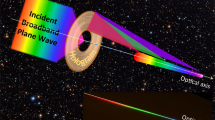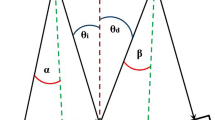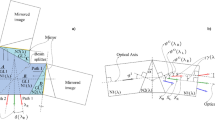Abstract
THE relative intensity of the short wavelengths in stellar spectra can be increased by means of a partial achromatization device consisting of two reflexion gratings. Experiments at this observatory have given promising results, and suggest that devices like this may have applications in space research as well as in conventional astronomy.
This is a preview of subscription content, access via your institution
Access options
Subscribe to this journal
Receive 51 print issues and online access
$199.00 per year
only $3.90 per issue
Buy this article
- Purchase on Springer Link
- Instant access to full article PDF
Prices may be subject to local taxes which are calculated during checkout
Similar content being viewed by others
References
Wood, R. W., Physical Optics, 111 (The Macmillan Co., New York, 1934).
Wood, R. W., Physical Optics, 259 (The Macmillan Co., New York, 1934).
Tousey, R., Les Congrès de Liège, 20, 253 (1961).
Öhman, Y., Astrophys. J., 111, 363 (1950); Arkiv för Astronomi (in the Press).
Hulthén, E., and Lind, E., Arkiv för Fysik, 2, 24, 253 (1950).
Fehrenbach, Transactions Intern. Astron. Union, 8, 497 (1952).
Author information
Authors and Affiliations
Rights and permissions
About this article
Cite this article
ÖHMAN, Y. Subtractive Dispersion Spectrographs of Possible Use in Ultra-violet Stellar Research. Nature 215, 606–607 (1967). https://doi.org/10.1038/215606a0
Received:
Issue Date:
DOI: https://doi.org/10.1038/215606a0
Comments
By submitting a comment you agree to abide by our Terms and Community Guidelines. If you find something abusive or that does not comply with our terms or guidelines please flag it as inappropriate.



